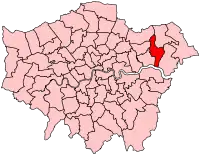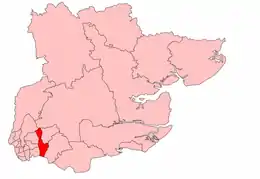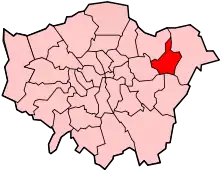Dagenham (UK Parliament constituency)
Dagenham was a borough constituency represented in the House of Commons of the UK Parliament that elected one Member of Parliament (MP) by the first past the post system of election. It was replaced at the 2010 general election largely by Dagenham and Rainham.
| Dagenham | |
|---|---|
| Former Borough constituency for the House of Commons | |
 Boundary of Dagenham in Greater London for the 2005 general election | |
| County | Greater London |
| 1945–2010 | |
| Number of members | One |
| Replaced by | Dagenham and Rainham |
| Created from | Romford |
Boundaries

1945–1974: The Borough of Dagenham.
1974–1983: The London Borough of Barking wards of Chadwell Heath, Eastbrook, Fanshawe, Heath, River, Valence, and Village.
1983–2010: The London Borough of Barking and Dagenham wards of Alibon, Chadwell Heath, Eastbrook, Fanshawe, Heath, Marks Gate, River, Triptons, Valence, and Village.
2010 Boundary change
Following their review of parliamentary representation in North London, the Boundary Commission for England created a new constituency of Dagenham and Rainham.
History
- History of Boundaries
Before 1945 this Dagenham constituency and surrounding area was part of the Romford constituency.
- Political History
The MP for the predecessor seat since 1935, Labour's John Parker, stood again on each occasion in this smaller successor area, representing it until 1983. Parker was the last serving MP to have been elected before the Second World War, and with 48 years in Parliament, remained the longest-serving Labour MP in history until Dennis Skinner served Bolsover for 49 years.
Dagenham was held by Labour since its inception and election predictions always rated it as a safe seat. Dagenham hosts an at times shrinking skilled manual industry such as the Ford Motor Company works, which downscaled production in 2001, leading to replacement distribution and warehousing businesses as well as local regeneration under the Thames Gateway project from 2005 however higher than national unemployment immediately, including following the seat's abolition. (See the main successor seat, Dagenham and Rainham for statistics.) The largest-polling opposition candidate was Conservative since 1979, with the Liberal Party a greater or equal opponent in elections before that, vying for second place with that party.
Unusually, the far-right British National Party (BNP) was very active in this area periodically and its support led to some retained deposits by polling more than 5% of the vote on several occasions. Their candidate received nearly 10% of the vote in the 2005 general election and in the 2006 local elections returned 12 councillors to Barking and Dagenham London Borough Council.
The new constituency of Dagenham and Rainham included wards which had not traditionally supported the BNP or Labour, and published leaks of BNP databases that year showed that its membership in the area shown was diminishing.
Members of Parliament
| Election | Member [1] | Party | |
|---|---|---|---|
| 1945 | John Parker | Labour | |
| 1983 | Bryan Gould | Labour | |
| 1994 by-election | Judith Church | Labour | |
| 2001 | Jon Cruddas | Labour | |
| 2010 | constituency abolished: see Dagenham and Rainham | ||
Election results
Elections in the 1940s
| Party | Candidate | Votes | % | ±% | |
|---|---|---|---|---|---|
| Labour | John Parker | 36,686 | 83.69 | ||
| Conservative | Albert Cooper | 7,147 | 16.31 | ||
| Majority | 29,539 | 67.38 | |||
| Turnout | 43,833 | 69.08 | |||
| Registered electors | 63,450 | ||||
| Labour win (new seat) | |||||
Elections in the 1950s
| Party | Candidate | Votes | % | ±% | |
|---|---|---|---|---|---|
| Labour | John Parker | 43,300 | 72.50 | -11.19 | |
| Conservative | D. Cook | 11,565 | 19.37 | +3.06 | |
| Liberal | Ivy Elizabeth Hallett Thurston | 3,973 | 6.65 | New | |
| Communist | George Bridges[7] | 883 | 1.48 | New | |
| Majority | 31,735 | 53.13 | -14.25 | ||
| Turnout | 59,721 | 81.28 | +12.20 | ||
| Registered electors | 73,477 | ||||
| Labour hold | Swing | -7.13 | |||
| Party | Candidate | Votes | % | ±% | |
|---|---|---|---|---|---|
| Labour | John Parker | 44,908 | 76.09 | +3.59 | |
| Conservative | Norman St John-Stevas | 14,112 | 23.91 | +4.54 | |
| Majority | 30,796 | 52.18 | +0.95 | ||
| Turnout | 59,020 | 77.72 | -3.56 | ||
| Registered electors | 73,939 | ||||
| Labour hold | Swing | -0.48 | |||
| Party | Candidate | Votes | % | ±% | |
|---|---|---|---|---|---|
| Labour | John Parker | 38,811 | 73.88 | -2.21 | |
| Conservative | Roger Ibbotson Gray | 13,718 | 26.12 | +2.21 | |
| Majority | 25,093 | 47.76 | -4.42 | ||
| Turnout | 52,529 | 68.94 | -8.78 | ||
| Registered electors | 76,198 | ||||
| Labour hold | Swing | -2.21 | |||
| Party | Candidate | Votes | % | ±% | |
|---|---|---|---|---|---|
| Labour | John Parker | 37,009 | 69.00 | -4.88 | |
| Conservative | Andrew Felix Waley | 16,626 | 31.00 | +4.88 | |
| Majority | 20,383 | 38.00 | -9.76 | ||
| Turnout | 53,635 | 72.51 | +3.57 | ||
| Registered electors | 73,968 | ||||
| Labour hold | Swing | -4.88 | |||
Elections in the 1960s
| Party | Candidate | Votes | % | ±% | |
|---|---|---|---|---|---|
| Labour | John Parker | 32,851 | 64.82 | -4.18 | |
| Conservative | Giles E Currie | 9,461 | 18.67 | -12.33 | |
| Liberal | Patrick Thurlbeck Humphrey | 7,301 | 14.41 | New | |
| Communist | Kevin Halpin | 1,070 | 2.11 | New | |
| Majority | 23,390 | 46.15 | +8.15 | ||
| Turnout | 50,683 | 70.96 | -1.55 | ||
| Registered electors | 71,424 | ||||
| Labour hold | Swing | +4.08 | |||
| Party | Candidate | Votes | % | ±% | |
|---|---|---|---|---|---|
| Labour | John Parker | 35,055 | 74.65 | +9.83 | |
| Conservative | Giles E Currie | 10,530 | 22.42 | +3.75 | |
| Communist | George C Wake | 1,373 | 2.92 | +0.81 | |
| Majority | 24,525 | 52.23 | +6.08 | ||
| Turnout | 46,958 | 67.40 | -3.56 | ||
| Registered electors | 69,671 | ||||
| Labour hold | Swing | +3.04 | |||
Elections in the 1970s
| Party | Candidate | Votes | % | ±% | |
|---|---|---|---|---|---|
| Labour | John Parker | 31,335 | 70.74 | ||
| Conservative | Hugh McClancy | 11,976 | 27.04 | ||
| Communist | George C Wake | 982 | 2.22 | ||
| Majority | 19,359 | 43.70 | |||
| Turnout | 44,290 | 59.05 | |||
| Labour hold | Swing | ||||
| Party | Candidate | Votes | % | ±% | |
|---|---|---|---|---|---|
| Labour | John Parker | 35,765 | 72.68 | ||
| Conservative | Archie Hamilton | 12,275 | 24.94 | ||
| Communist | George C Wake | 1,169 | 2.38 | ||
| Majority | 23,490 | 47.74 | |||
| Turnout | 49,209 | 71.02 | |||
| Labour hold | Swing | ||||
| Party | Candidate | Votes | % | ±% | |
|---|---|---|---|---|---|
| Labour | John Parker | 29,678 | 65.23 | ||
| Conservative | Archie Hamilton | 7,684 | 16.89 | ||
| Liberal | G Poole | 7,564 | 16.63 | New | |
| Communist | George C Wake | 569 | 1.25 | ||
| Majority | 21,994 | 48.34 | |||
| Turnout | 45,495 | 64.99 | |||
| Labour hold | Swing | ||||
| Party | Candidate | Votes | % | ±% | |
|---|---|---|---|---|---|
| Labour | John Parker | 24,707 | 52.57 | ||
| Conservative | G Hyams | 14,600 | 31.07 | ||
| Liberal | M Long | 5,583 | 11.88 | ||
| National Front | J Roberts | 1,553 | 3.30 | New | |
| Communist | D Connor | 553 | 1.18 | ||
| Majority | 10,107 | 21.50 | |||
| Turnout | 46,994 | 69.12 | |||
| Labour hold | Swing | ||||
Elections in the 1980s
| Party | Candidate | Votes | % | ±% | |
|---|---|---|---|---|---|
| Labour | Bryan Gould | 15,665 | 39.26 | ||
| Conservative | Bob Neill | 12,688 | 31.77 | ||
| SDP | J Horne | 10,679 | 27.00 | New | |
| National Front | Joe Pearce | 645 | 1.62 | ||
| Communist | D Walshe | 141 | 0.35 | ||
| Majority | 2,997 | 7.49 | |||
| Turnout | 39,878 | 63.34 | |||
| Labour hold | Swing | ||||
| Party | Candidate | Votes | % | ±% | |
|---|---|---|---|---|---|
| Labour | Bryan Gould | 18,454 | 44.4 | +5.1 | |
| Conservative | Bob Neill | 15,985 | 38.5 | +6.7 | |
| SDP | John Carter | 7,088 | 17.1 | -9.9 | |
| Majority | 2,469 | 5.9 | -1.6 | ||
| Turnout | 41,527 | 67.3 | +4.0 | ||
| Labour hold | Swing | ||||
Elections in the 1990s
| Party | Candidate | Votes | % | ±% | |
|---|---|---|---|---|---|
| Labour | Bryan Gould | 22,027 | 52.26 | ||
| Conservative | Don Rossiter | 15,294 | 36.29 | ||
| Liberal Democrats | Charles Marquand | 4,824 | 11.45 | ||
| Majority | 6,733 | 15.97 | |||
| Turnout | 42,145 | 70.66 | |||
| Labour hold | Swing | ||||
| Party | Candidate | Votes | % | ±% | |
|---|---|---|---|---|---|
| Labour | Judith Church | 15,474 | 72.0 | +19.74 | |
| Conservative | James Fairrie | 2,130 | 9.91 | -26.38 | |
| Liberal Democrats | Peter Dunphy | 1,804 | 8.39 | -3.06 | |
| BNP | John Tyndall | 1,511 | 7.03 | New | |
| UKIP | Peter Compobassi | 457 | 2.1 | New | |
| Natural Law | Mark Leighton | 116 | 0.5 | New | |
| Majority | 13,344 | 62.1 | +56.1 | ||
| Turnout | 21,492 | ||||
| Labour hold | Swing | ||||
| Party | Candidate | Votes | % | ±% | |
|---|---|---|---|---|---|
| Labour | Judith Church | 23,759 | 65.7 | +13.4 | |
| Conservative | James P.J. Fairrie | 6,705 | 18.5 | −17.8 | |
| Liberal Democrats | Thomas Dobrashian | 2,704 | 7.5 | −3.9 | |
| Referendum | Steven Kraft | 1,411 | 3.9 | New | |
| BNP | William Binding | 900 | 2.5 | N/A | |
| Independent | Richard H. Dawson | 349 | 1.0 | New | |
| National Democrats | Michael B. Hipperson | 183 | 0.5 | New | |
| ProLife Alliance | Kathleen A. Goble | 152 | 0.4 | New | |
| Majority | 17,054 | 47.2 | +32.3 | ||
| Turnout | 36,162 | 62.1 | -8.6 | ||
| Labour hold | Swing | ||||
Elections in the 2000s
| Party | Candidate | Votes | % | ±% | |
|---|---|---|---|---|---|
| Labour | Jon Cruddas | 15,784 | 57.2 | −8.5 | |
| Conservative | Michael White | 7,091 | 25.7 | +7.2 | |
| Liberal Democrats | Adrian Gee-Turner | 2,820 | 10.2 | +2.7 | |
| BNP | David Hill | 1,378 | 5.0 | +2.5 | |
| Socialist Alliance | Bill Hamilton | 262 | 0.9 | New | |
| Socialist Labour | Robert Siggins | 245 | 0.9 | New | |
| Majority | 8,693 | 31.5 | -15.7 | ||
| Turnout | 27,580 | 46.5 | −15.6 | ||
| Labour hold | Swing | ||||
| Party | Candidate | Votes | % | ±% | |
|---|---|---|---|---|---|
| Labour | Jon Cruddas | 15,446 | 50.1 | −7.1 | |
| Conservative | Michael White | 7,841 | 25.4 | -0.3 | |
| Liberal Democrats | James Kempton | 3,106 | 10.1 | -0.1 | |
| BNP | Lawrence Rustem | 2,870 | 9.3 | +4.3 | |
| UKIP | Gerard Batten | 1,578 | 5.1 | New | |
| Majority | 7,605 | 24.7 | -6.8 | ||
| Turnout | 30,841 | 51.3 | +4.8 | ||
| Labour hold | Swing | −3.4 | |||
References
- Leigh Rayment's Historical List of MPs – Constituencies beginning with "D" (part 1)
- British Parliamentary Election Results 1918-1949, FWS Craig
- Kimber, Richard. "UK General Election results 1945". Political Science Resources. Archived from the original on 4 March 2016. Retrieved 14 April 2016.
- British parliamentary election results, 1950-1973 by FWS Craig
- Kimber, Richard. "UK General Election results 1950". Political Science Resources. Archived from the original on 1 May 2016. Retrieved 14 April 2016.
- Stevenson, Graham. "Bridges George Senior". Archived from the original on 18 April 2017. Retrieved 18 April 2017.
- Kimber, Richard. "UK General Election results 1951". Political Science Resources. Archived from the original on 29 June 2017. Retrieved 14 April 2016.
- Kimber, Richard. "UK General Election results 1955". Political Science Resources. Archived from the original on 11 August 2011. Retrieved 14 April 2016.
- Kimber, Richard. "UK General Election results 1959". Political Science Resources. Archived from the original on 11 August 2011. Retrieved 14 April 2016.
- Kimber, Richard. "UK General Election results 1964". Political Science Resources. Archived from the original on 29 June 2017. Retrieved 14 April 2016.
- Kimber, Richard. "UK General Election results 1966". Political Science Resources. Archived from the original on 11 August 2011. Retrieved 14 April 2016.
- "Archived copy". Archived from the original on 2011-08-11. Retrieved 2009-12-17.CS1 maint: archived copy as title (link)
- "Archived copy". Archived from the original on 2011-08-11. Retrieved 2009-12-17.CS1 maint: archived copy as title (link)
- "Archived copy". Archived from the original on 2011-08-11. Retrieved 2009-12-17.CS1 maint: archived copy as title (link)
- "Archived copy". Archived from the original on 2011-08-11. Retrieved 2009-12-17.CS1 maint: archived copy as title (link)
- "Election Data 1983". Electoral Calculus. Archived from the original on 15 October 2011. Retrieved 18 October 2015.
- "Archived copy". Archived from the original on 2011-08-11. Retrieved 2009-12-17.CS1 maint: archived copy as title (link)
- "Election Data 1987". Electoral Calculus. Archived from the original on 15 October 2011. Retrieved 18 October 2015.
- "Archived copy". Archived from the original on 2011-05-22. Retrieved 2009-12-17.CS1 maint: archived copy as title (link)
- "Election Data 1992". Electoral Calculus. Archived from the original on 15 October 2011. Retrieved 18 October 2015.
- "Election Data 1997". Electoral Calculus. Archived from the original on 15 October 2011. Retrieved 18 October 2015.
- "Archived copy". Archived from the original on 2012-05-10. Retrieved 2009-11-23.CS1 maint: archived copy as title (link)
- "Election Data 2001". Electoral Calculus. Archived from the original on 15 October 2011. Retrieved 18 October 2015.
- "Election Data 2005". Electoral Calculus. Archived from the original on 15 October 2011. Retrieved 18 October 2015.
| Parliament of the United Kingdom | ||
|---|---|---|
| Preceded by Vauxhall |
Constituency represented by the Father of the House 1979–1983 |
Succeeded by Cardiff South and Penarth |
